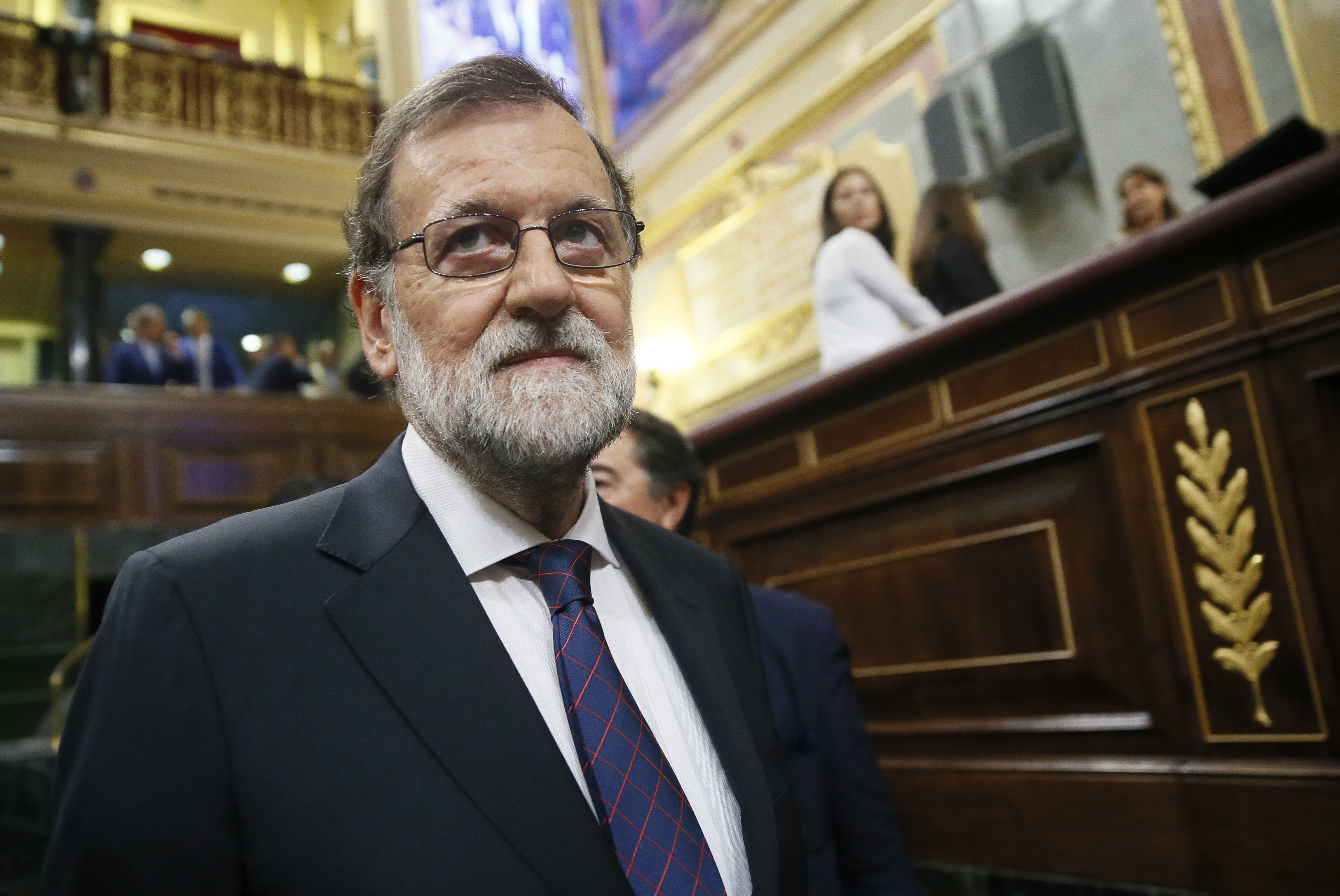The defence of the unity of Spain must be prioritised over any explanations about the Gürtel corruption case or the funding of the Popular Party (PP). That was the subtle message that prime minister Mariano Rajoy gave today during a debate in the Spanish Congress. Rajoy appealed for a united effort at the state level in the face of challenges such as jihadist terrorism and the "challenge from those who want to eliminate" Spanish sovereignty. The head of Spain's government heated up the debate before the "magnitude of the provocation" in Catalonia and accused the independence movement of being an "autocratic project".
"The Spanish government will defend the rights of all Spaniards and will protect the Catalans from an autocratic project led by radicals." With those words, Rajoy covertly urged PSOE (Spanish Socialist Workers’ Party) and Podemos (We Can) to abandon their "obsession" and "inquisitorial zeal" for having made him appear, after he appeared as a witness in the National Audience high court on 26th July. The prime minister attacked strongly and boasted that the chamber had given him its confidence twice: during his investiture as prime minister and with Pablo Iglesias' recent failed motion of no-confidence.
This could be interpreted as a challenge for a new motion. "That's how you ask for responsibilities," responded the opposition. More important is that he later returned to a topical question: the informal meeting between the vice-president of Catalonia, Oriol Junqueras, and Podemos's Pablo Iglesias at a party held by the businessperson Jaume Roures. Rajoy asked to know what was discussed at the meeting, as PP spokesperson Rafael Hernando has already done, because there is speculation that they talked about the attempt to make PSOE's Pedro Sánchez prime minister before Christmas.
Rajoy also denounced the political aims and "sectarianism" that he sees in PSOE and PP's actions. Firstly, that there were already two commissions in the Congress to deal with the PP "caixa B" accusations and that four ex-treasurers of the party had appeared from "more than a quarter of a century ago". In second place, he discussed the 53 debates in the Congress, Senate, commissions and television where he believe the topic was discussed. Finally, he mentioned various measures taken by his government to push for regeneration.
PSOE has taken up the mantle: spokesperson Margarita Robles criticised Rajoy for "using the problems of Catalonia to not face up to" the debate
PSOE took up the mantle of Catalonia and its spokesperson Margarita Robles criticised Rajoy for "using the problems of Catalonia to not face up to" the debate in question. Robles argued that her party was acting out of a "sense of state" and that as such dared to ask for his resignation "out of dignity in the face of the violation of rights in Catalonia and for terrorism". "His testimony isn't believable", she said about his "arrogant" appearance at the National Audience. "You're sending the message 'Luís, be strong'". Why? Because this money comes from corruption?" she said, referring to Luís Barcenas, a former PP treasurer implicated in the scandal.
During Podemos' turn, Iglesias reminded the chamber that Rajoy's appearance was requested to discuss the alleged illegal financing of the PP. He expressed his confusion over a video that turned up of the leader of the PP, in which he talked about the financial side of the 2000 campaign, even though during his testimony in the Gürtel case he said that he only dealt with political matters. "I believe that it seemed normal to you for a party to be funded like that", he said sarcastically. "At what time did you find out about the illegal funding?" was one of the six questions he asked, to no response.
For Ciudadanos (Citizens), Albert Rivera maintained his argument that Rajoy had only offered the chamber a "meeting" and because of that he had not said the word "Gürtel" at any point. Therefore, he asked him to appear before the caixa B commission and reminded him that PP had lost its absolute majority. Rivera announced that on Monday he will present a law for term limits, included in the pact they negotiated with the PP when they agreed to support Rajoy's investiture as prime minister. He also took the opportunity to call for the removal of parliamentary privilege and a reform of legal power. "We don't want corrupt [politicians] to be pardoned. We want to remove them" he said.
Joan Tardà (ERC) recriminated Rajoy for not allowing the Catalan referendum to be held with arguments about the Spanish Constitution if he had already "broken" it
The spokesperson of ERC (Catalan Republican Left), Joan Tardà, has heated up the issue of the independence process and has accused the PP of "patriotism", defending the sovereignty project in the face of "the systematic corruption of the 1978 regime", referring to the year Spain transitioned to democracy after the Franco dictatorship. Likewise, Tardà assured the chamber that a vote will take place on 1st October, and denounced the tools that the Spanish state might use to avoid it. "All they have left is the violence of corrupt [people] to stay in power", he said. The republican recriminated the Spanish president for not allowing the Catalan referendum to be held with arguments about the Spanish Constitution if he had already "broken" it himself.
In PDeCAT's turn (Catalan European Democratic Party), spokesperson Carles Campuzano replied to Rajoy that it was a "democratic norm" to make him appear. Campuzano later linked the debate to the Catalan situation. "The corruption, for sure it's related to the disaffection we feel in Catalonia", he said. He also later asked PP to take responsibility because he thinks that they would have ended up unpunished. Finally he called the speech in the trial "disgraceful".

